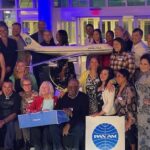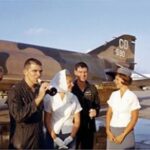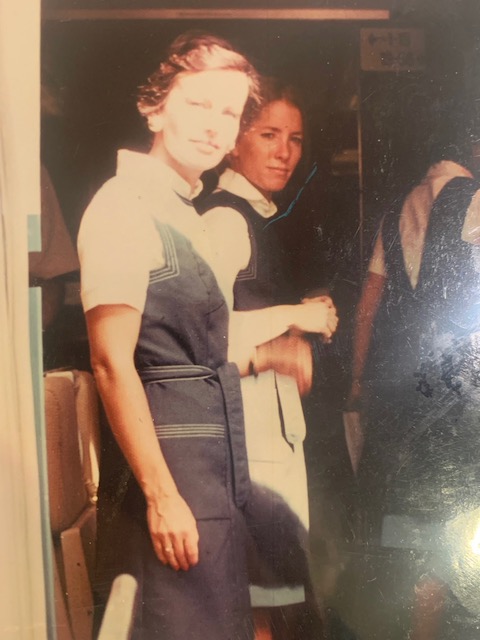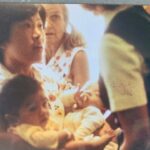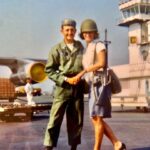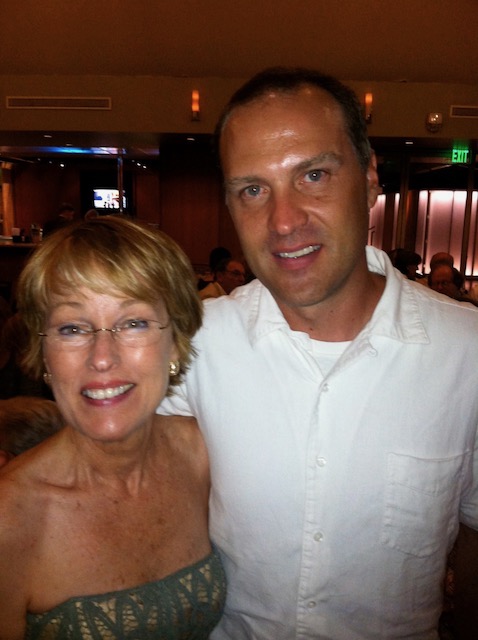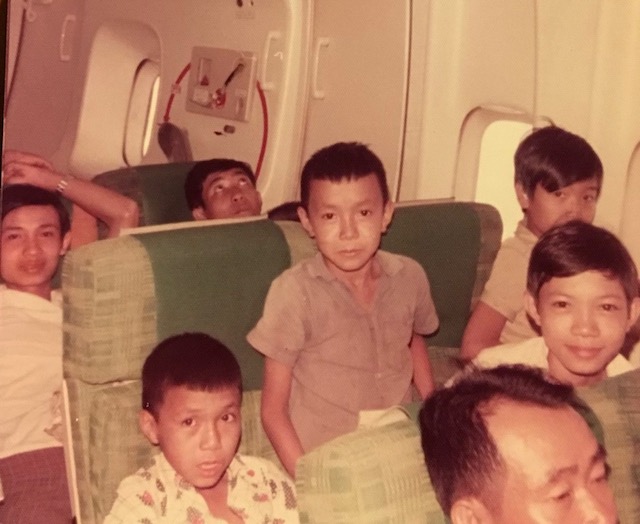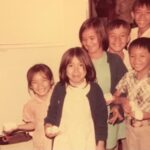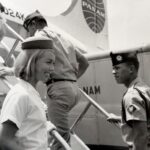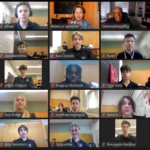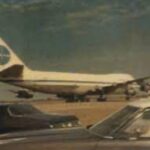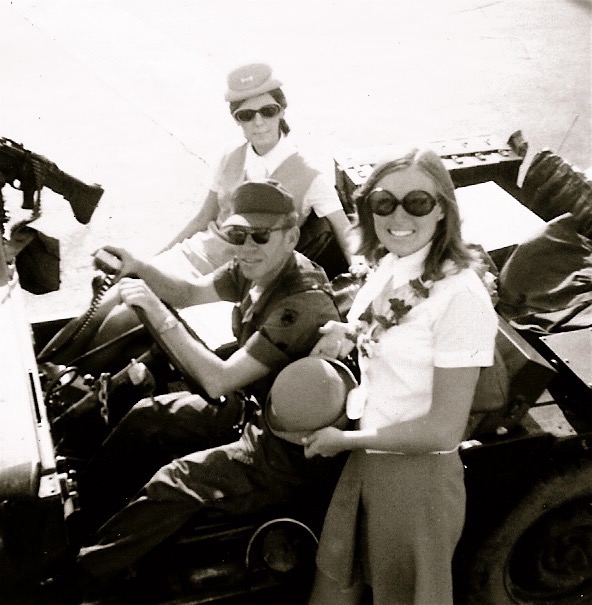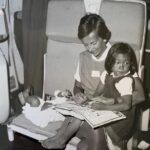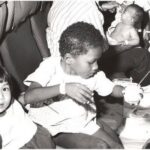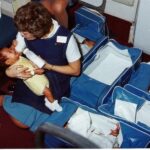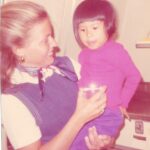Becky Sprecher was born in 1950 in Hopkinsville, Kentucky – the Baby Boom had begun. Becky remembers her elementary school teachers saying on the first day of school, “I’ve never had a class this big!” There were certain advantages in small town America in those days in that the kids could ride their bikes just about anywhere and the mothers didn’t necessarily know where they were. Kids could walk to the movie theatre downtown by themselves when they were 10 years old. But Becky makes it clear that people can romanticize the 1950s. It was a time of segregation. She was white, so she had access to a swimming pool and tennis courts in the summer. The black kids did not, and they had a separate school until her senior year. Also, women were relegated to traditional roles: girls were supposed to go to college and get a degree, but at graduation, the expectation was to be engaged. Becky recalls that women couldn’t get a mortgage in their own name, or a credit card. In terms of the Cold War she remembers the Cuban Missile Crisis well because she dressed up like Castro for Halloween, and she remembers when the neighbors across the street were building their house – they put in a bomb shelter in the basement. Becky also remembers where she was when a cousin came running in and said that the Marines had landed in Vietnam in 1965. From then on, Vietnam was at the forefront of everyone’s minds. Becky graduated from high school in 1968. In the second semester of her senior year, the Tet Offensive started, Martin Luther King was assassinated, and some of her classmates received draft notices. A week after graduation, Bobby Kennedy was assassinated. She had one brother a class ahead of her and remembers when he had to report to the local draft board to register. He had severe asthma, so he did not pass the physical. They both went to the University of North Carolina at Chapel Hill where the campus protest movement was in full swing. At the heart of this movement was the fact that these young men were getting drafted at age 18, and in all but two states, they could not vote until they were 21. So they were being asked to fight in a war without having a voice in selecting their Commander-in-Chief. Becky remembers being in the protests leading up to the Moratorium in Washington; some of her friends were vets who had come back from Vietnam on the GI bill. The movement peaked in the spring of 1970 when the students became aware of the fact that President Nixon had been bombing Cambodia without authorization. The campuses went crazy. Then something horrible happened: several students were shot and killed by the National Guard at Kent State. Other things that were very influential during that time were the Women’s Movement and the Sexual Revolution. When Becky graduated in 1972, she remembers that getting married was the farthest thing from her mind. She knew that she wanted to travel and see the world, so she interviewed with Pan Am and was hired. She flew for six years, first out of JFK, and she was then transferred to Honolulu in late March of 1973. Her first trip was to Saigon, via Guam and Manila. When she arrived for her first briefing, they told her she had to have her picture taken for a Geneva Card. She learned about the provisions of the Geneva Convention for the treatment of prisoners. They were flying into what was classified as a war zone in Saigon, and even though actual combat was far away if they were shot down and survived, they were to be treated as Lieutenants in the US Air Force. She knew that the Paris Peace Accords had been signed earlier that year and that they were bringing the soldiers home. What she did not know was that her flights during that time would be bringing back some of the remaining detachments. She remembers vividly standing on the tarmac at the bottom of the stairs to greet the oncoming passengers. When the soldiers came out and walked towards the plane, she recalls being overwhelmed with emotion. Becky had objected to the war because she wanted the killing to stop, not because she disrespected the troops. They were coming home without a win, and her job now was to take care of these guys and make them feel better. So she did what every Pan Am stewardess in those days did; she placed her hand on their arm or their shoulder, and just smiled and said, “Welcome home.” After the drawdown, they had pretty light loads going in and out of Saigon, but one thing they almost always had was a small contingent of babies and children who were being adopted in the United States. They were in small groups—up to 20- 25 babies and children with 4 or 5 escorts. In early 1975, she had additional trips to Saigon, each time with more orphans. The first trip there were 25, the next 50, the next 100. This meant the countryside was in crisis from the North Vietnamese advance. In spite of the fact that everyone in the United States was extremely divided in their feelings about Vietnam, they reached out to the youngest victims of the conflict and adopted them. Becky interviewed some of the Pan Am flight attendants who worked Operation Babylift, where a 747 was packed full of orphans and children, many of whom had just survived the crash of a C-5A. This was indeed the spirit of Pan Am; to be a beacon of hope for people in need no matter where they were. After the Fall of Saigon Becky was called out for several Refugee Charters, where we were bringing in refugees from Guam to Honolulu. On one occasion a flight was rerouted to Taipei, where they eventually picked up boat people who had come ashore in southern Taiwan. Every April 30th, Becky thinks about Vietnam and all those babies and children. She remembers holding a little girl named Mimi who was three years old while her father, who had been a South Vietnamese Army officer, took a picture. They had escaped from Da Nang and were on one of her refugee charter flights, and Becky still wonders what happened to them. Becky zoomed with Crestwood students in May 2023, sharing her remarkable story of the Freedom Birds and Operation Babylift.
